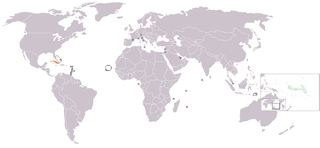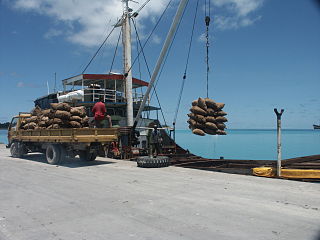
Kiribati, officially the Republic of Kiribati, is an island country in the Micronesia subregion of Oceania in the central Pacific Ocean. Its permanent population is over 119,000 as of the 2020 census, with more than half living on Tarawa atoll. The state comprises 32 atolls and one remote raised coral island, Banaba. Its total land area is 811 km2 (313 sq mi) dispersed over 3,441,810 km2 (1,328,890 sq mi) of ocean.

Kiribati is a full member of the Commonwealth, the IMF and the World Bank, and became a full member of the United Nations in 1999. Kiribati hosted the Thirty-First Pacific Islands Forum in October 2000. Kiribati has Least Developed Country Status and its interests rarely extend beyond the region. Through accession to the Lomé Convention, then Cotonou Agreement, Kiribati is also a member of the African Caribbean and Pacific Group. Kiribati maintains good relations with most countries and has particularly close ties to Pacific neighbours Japan, Australia, South Korea and New Zealand. Kiribati briefly suspended its relations with France in 1995 over that country's decision to renew nuclear testing in the South Pacific.

The Gilbert Islands are a chain of sixteen atolls and coral islands in the Pacific Ocean, about halfway between Papua New Guinea and Hawaii. They constitute the main part of the country of Kiribati.

"Kunan Kiribati", also known by its incipit, "Teirake Kaini Kiribati", is the national anthem of Kiribati. It was written and composed by Ioteba Tamuera Uriam and adopted upon independence on 12 July 1979. Its lyrics were confirmed as per Schedule 3 of the National Identity Act 1989.

Kiribati and the United States have diplomatic relations. Geographically, Kiribati is the closest neighboring country to the state of Hawaii.
The Kiribati Uniting Church (KUC) is a united Protestant Christian denomination in Kiribati. With approximately 25,000 members, and 136 congregations, the KUC is the second-largest religious group in Kiribati and accounts for approximately 21 percent of the population of the country.

Christianity is the predominant religion in Kiribati, with Catholicism being its largest denomination.
Education in Kiribati is free and compulsory from age 6 to 14, which includes primary school through grade six, and Junior Secondary School for three additional grade levels. In 1998, the gross primary enrollment rate was 84.4 percent, and net primary enrollment rate was 70.7 percent. School quality and access to education are better in urban areas; schools in small communities on isolated islands are expensive to maintain. Mission schools are slowly being absorbed into the government primary school system.
Cuban-Pacific relations are diplomatic, economic, cultural, and other relations between the Cuba and countries situated in Oceania. In the 2000s, Cuba has been strengthening its relations with Pacific nations, which have, for the most part, responded favorably to Cuban medical aid in particular. The first Cuba-Pacific Islands ministerial meeting was held in September 2008 in Havana, with government members from ten Pacific countries—Kiribati, Tuvalu, Nauru, Solomon Islands, Fiji, Tonga, Vanuatu, Samoa, the Federated States of Micronesia and Papua New Guinea—attending. The meeting was a consolidation rather than a starting point of Cuban-Pacific relations.

Diplomatic relations between Kiribati and Cuba developed in the 2000s (decade). Like other countries in Oceania, Kiribati is a beneficiary of Cuban medical aid; bilateral relations between Tarawa and Havana must be viewed within the scope of Cuba's regional policy in Oceania.

The Republic of Kiribati and the People's Republic of China (PRC) established diplomatic relations on June 25, 1980, and resumed on September 27, 2019. Between 2003 and 2019, The government of Kiribati recognized the Republic of China, and, in accordance with the "One China" policy, the People's Republic of China did not have diplomatic relations to the country.
Dr. Harry Tong, is an I-Kiribati politician with Chinese heritage. He was born in Tabuaeran, Line Islands and is the second child of Chinese immigrant Tong Ting Hai and Nei Keke Randolph, of Abaiang and Maiana. Harry Tong attended Wanganui Collegiate School in New Zealand, and then went on to complete his medical training at the Fiji School of Medicine.

KoreKorea was a term used for girls in Kiribati who Korean fishermen paid for sex. They are now called ainen matawa locally "in deference to Korean sensitivities", because the word "Korekorea" was overtly linked to the "principal nationality of their clients". Some of the girls are as young as fourteen years old. They board foreign fishing vessels and engage in sex in exchange for money, clothes and fish.
The Kiribati Protestant Church (KPC) and earlier, the Gilbert Islands Protestant Church, is a Protestant Christian denomination in Kiribati. With approximately 10,000 members, and 136 congregations, the KPC was the second-largest religious group in Kiribati before creation of the new Kiribati Uniting Church and accounts now for approximately 8 percent of the population of the country.
King George V School (KGV) was a government high school for boys in the Gilbert Islands, within the British colony Gilbert and Ellice Islands. Throughout its history it was in multiple locations in South Tarawa and Abemama. It served as a boarding school, and trained people to be government workers and teachers.
Hiram Bingham High School (HBHS) is a secondary school in Rongorongo, Beru Island, Kiribati, serving forms 1-7. It is affiliated with the Kiribati Uniting Church. It has boarding facilities.

Kiribati National Olympic Committee is the National Olympic Committee representing Kiribati. The same committee is also known as the Kiribati Commonwealth Games Association.








